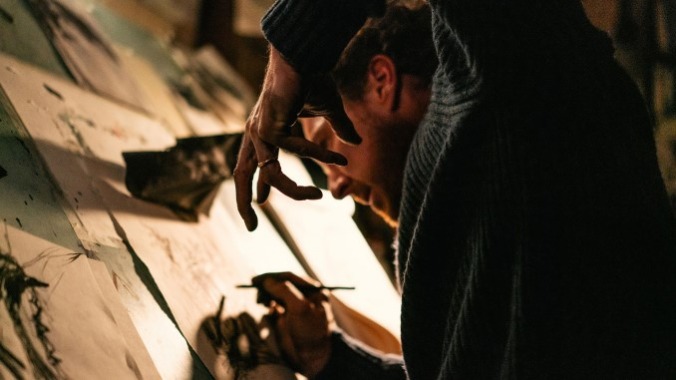The Thing With Feathers Is a Creepily Effective Meditation on a Family’s Grief

Dylan Southern’s The Thing with Feathers is a chilling departure for the documentarian behind Shut Up and Play the Hits and Meet Me in the Bathroom. His grief-stricken creature feature adapts Max Porter’s moving novella “Grief Is The Thing With Feathers,” itself referencing Emily Dickinson’s poem “Hope is the thing with feathers.” Literary whimsy flows through the project’s DNA, yet Southern’s screenplay shaves storytelling into a more rigid tale of familial loss. Benedict Cumberbatch is an unsurprisingly strong anchor as a widowed father whose ink-black drawings of a crow character become too real, but the film’s inescapably sorrowful themes beat viewers over the head with a bit too much force.
Cumberbatch is credited as “Dad,” an English graphic novelist left overwhelmed after the death of his beloved wife. His “Boys,” played by brothers Richard Boxall and Henry Boxall, are now single-parent siblings. Their home is in utter chaos without its matriarch; the glue holding everything together has vanished. After Cumberbatch’s well-meaning father blazes through a few “failing dad” tropes like burning breakfast toast and failing to enforce bath time, an intimidating crow entity appears (voiced by David Thewlis). Should dear old dad fear the beady-eyed visitor, or listen to its bleak wisdom before something worse comes calling?
Southern’s intentions are caught between beastly horrors and searing melodrama. Eric Lampaert physically portrays a midnight-colored bird monstrosity that looms over Cumberbatch, complete with claw-like talons and a pointed beak. Yet, the Crow isn’t there to harm his human targets — he’s a helpful, healing force. What’s easily perceived as an instant villain by haunted genre standards is a misdirect, or more appropriately, the on-screen manifestation of grief. Southern doesn’t want the crow to scare us away as its philosophical and therapeutic presence becomes known. Frustratingly, that won’t matter to viewers who succumb to tonal confusion invited by darkened fantasy imagery used in an unexpected way.
That said, The Thing with Feathers doesn’t feel at odds with itself. Crow’s emergence as this Babadookian “Trauma Horror” villain quickly fades into a curious coexistence, where Cumberbatch’s performance shines. As Thewlis mocks “Sad Dad” for being a whiskey-slugging, distancing cliché of an “English Widower,” Cumberbatch starts acting more crow-like. The fantasy and reality of Crow’s existence become a constant battle within Cumberbatch, who throws himself into the eye of grief’s treacherous storm. He’s toying with common tropes of loss, self-sabotage, and depression, but his outbursts are earnest, and his brokenness organic. The crowy attributes play almost like a possession arc, adding genre perilousness to already gripping dramatic weights.
-

-

-

-

-

-

-

-

-

-

-

-

-

-

-

-

-

-

-

-

-

-

-

-

-

-

-

-

-

-

-

-

-

-

-

-

-

-

-

-








































